Dirk Gently: The Music
Dirk Gently musical composer Daniel Pemberton reveals the influences and very odd instruments that created the Dirk sound
http://www.youtube.com/watch?v=TI4CExqVr7w
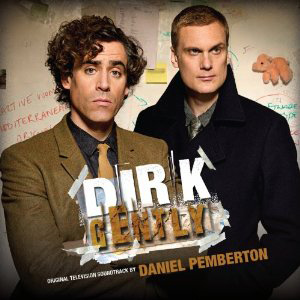
SFX talks to Daniel Pemberton, one-time (a long, long while ago) console games journalist, now a TV, film and computer games composer with credits to his name such as The Awakening , LittleBigPlanet , Desperate Romantics and, most excitingly for us, Dirk Gently . With the soundtrack to that now out on CD (click the image, left) or to download at iTunes and other digital download outlets, we chat to him about his influences and his loves and loathes when it comes to soundtrack music.
How did you get the job of writing the music for Dirk Gently?
Daniel Pemberton: I was a massive fan of Douglas Adams. Hitchhiker’s , I loved. I never loved Dirk quite as much as Hitchhiker’s , I think because when I read it I was too young and I loved Hitchhiker’s too much. But I was still a fan.
Fast forward 20 years, 30 years – a long time – and I started working with the producer, Chris Carey, who became the producer on Dirk. And he got the rights to it and I was like, “Oh my God, you’ve got to let me do that!”
It was in development for a long time and then it just sort of happened.
Sign up to the SFX Newsletter
Get sneak previews, exclusive competitions and details of special events each month!
Was the quirky style of the music your idea or was that what the producers asked for?
Chris said some words that nobody has ever really said to me before. He said, “I want a really good theme tune.” That’s all he said to me: “I want a really good theme tune.” And I was like, “Alright, I’ll give you one of those.” It was really weird, nobody says that to you: “I want something really catchy I can hum.” But if somebody gives you that clear direction then actually it’s quite exciting because you can do something that’s really great and really in your face.
So most of the sound comes from me, really, in terms of what it was. I really wanted to use an instrument called a Marxophone from the 20s. Door-to-door salesmen used to sell them; they were supposed to be easy to play if you had no musical talent. I’d seen one of those years and years ago and in my head I was like, “I’ve gotta get one of those one day, it’ll come in handy.”
And when this job came up I was like, “Okay, I’ve got to buy it now.” So I was on eBay, weeks wasted being constantly outbid. And then I found one that was in perfect condition, being sold by a comic book dealer in liquidation.
Marxophones are a mad cross between a zither and a piano. We used that, and we used a lot of mad instruments. We used this thing called a taishogoto . Which is like a kind of a mad Japanese guitar. I’m trying to think of what else we used… a clapped-out old synth. I basically just shoved together as many odd instruments as I could and just sort of patched it all up with some sellotape and crossed my fingers.
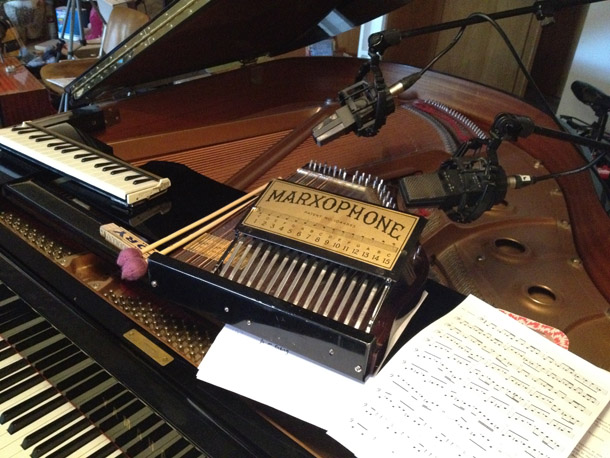
So that was key to the Dirk sound. Also I wanted to reference things like Henry Mancini’s “Peter Gunn” that film noir detective feel. There’s also a bit of Roy Budd’s score for Get Carter – his finest score. At the same time, I wanted to pull in great British TV music – The Prisoner , Randall & Hopkirk , all these shows that I love that.
I felt Dirk Gently sits very much in that vein, shows where the music was fun; it was in your face and had a sense of humour. I feel that’s kind of missing a lot in TV now because it’s hard to do that and get away with it. Higher up the chain, in terms of execs, people are scared of music that’s quite strong and in your face. There is a lot more of a tendency for things to be held back. On Dirk , we really didn’t do that and sometimes I probably went over the top.
We had to lose a couple of things. There’s this one scene where I basically did a massive harpsichord solo based on “The Flight Of The Bumblebee” over the roof-top chase in episode three, and everybody was like “That’s not happening!” Come on! COME ON ! They were probably right. I have to rein back; I press my too-mental buttons sometimes.
Sounds like this was a dream project because you could experiment with things you’ve wanted to experiment with for ages.
I really, really love Dirk Gently . I mean, I’ve always been drawn to the character because in some ways he reminds me of me. A bit tight and likes pizza. And also, his office was based on my flat.
Really?
When they interviewed me for the job officially they came around my house. Chris, the producer, and Damon Thomas, the director of the first show, came over for a chat and my house was a mess at the time. I said, “I’m in the middle of a big job – flat’s very messy because I’m working rather than tidying up.” My flat is always quite messy anyway, but it’s exceptionally messy if I’m in the middle of a big series or something.
And Chris just looks around and goes, “You know, this is what Dirk’s office would look like?” “What a tip?” “Yeah, a mental mess. Do you mind if you take some photos?” And I’m like, “Knock yourself out.”
There is this moment in the second series where piles of paper fall on the floor. It’s like a two-second gag but that happens to me quite a lot. There’s paper on my keyboard that just fall off onto the floor... that’s another way I feel very connected to the show.
Next page for more on Dirk , LittleBigPlanet and The Awakening
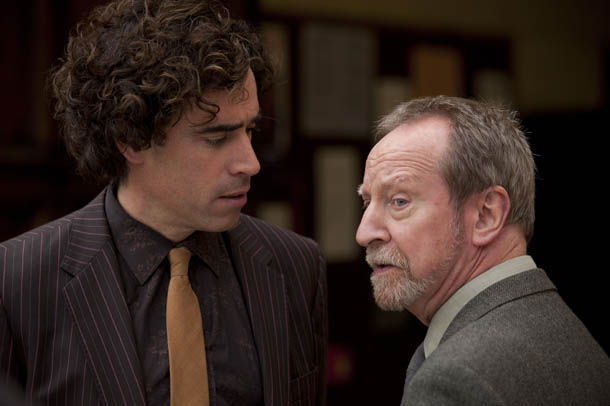
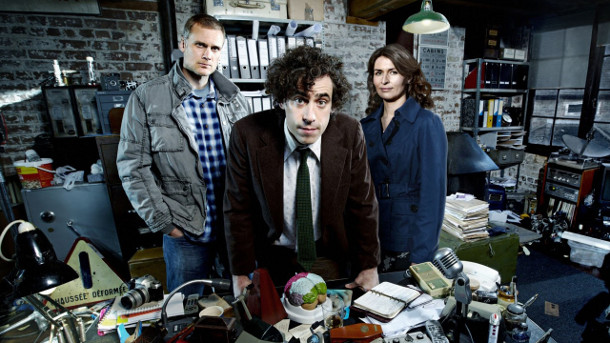
How did you go from being console games journalist to a screen composer?
Basically I started writing about video games when I was 13. Now I look back and that is quite weird. I used to write for magazines like Sega Zone and Game Zone . With the money from that I bought some music gear which was a lot harder to get into in those days than it is now, and started making weird ambient electronic music. And through that, people heard it and then I got offered some record deals. I was quite young – I had my first record out when I was 16.
But I got quite quickly disillusioned with the music industry because I realised that if you want to have a career you have to do the same thing over and over again. Then I sort of fell into doing TV music through a director who had head the album. So I started doing that after school, like some very small documentaries for Channel Four. Then I took a year out to see how it went, and essentially now I’m still on my year out. 15 years later.
And it has been madness since then, really busy. I actually really, really care about TV music. A lot of people then, and possibly people now, were a bit sniffy about it and didn’t really see it as a proper way of expressing yourself; just something to pay the bills. I think because I approached it the same as if I were in a band trying to make a record, and make every show really interesting and have really interesting ideas and approaches, I got a lot of work. Because I really care about what goes out.
On our SFX forum, they’re always bemoaning “manipulative film and TV music”, saying, “I don’t want the music to tell me what to feel.” How do you feel about that?
That’s the Doctor Who forum, right?
We weren’t going to name names…
Yeah, I personally, honestly hate too much music in TV shows and actually, I’d say most composers will hate too much music. And it’s a real problem at the moment where soundtracks are covered in music all the way through, because that generally means, in my opinion, a couple of things.
One, you’re covering up stuff that isn’t in the show; you’re trying to cover up some mistakes.
Two, if you have constant music, you basically lose the emotional impact that music can give you, which is huge. But if you have it all the time, it becomes meaningless. It becomes background noise. Like if you eat steak every day for three weeks, after a while it’s not going to taste very good. Whereas if you eat it once every three weeks it’s going to taste amazing.
My favourite kind of scores are the ones where there’s very little music, but when it does come in, it’s really important and they really use it properly. My least favourite is where there’s music every two seconds telling you what to think.
And I’ve done jobs where the score has done just that and I don’t like it. I’ve had massive arguments on certain shows about exactly that thing. On the first series of Upstairs Downstairs there was just far too much music. I got quite annoyed about that and, you know, they ended up putting even more in. And you get people going, “You’ve got too much music. The composer should be shot,” and I’d be like, “Yes, there is too much music, I agree with you.”
In that instance there were a couple of amazing pieces but they lost their impact because they were surrounded by so many pieces that weren’t.
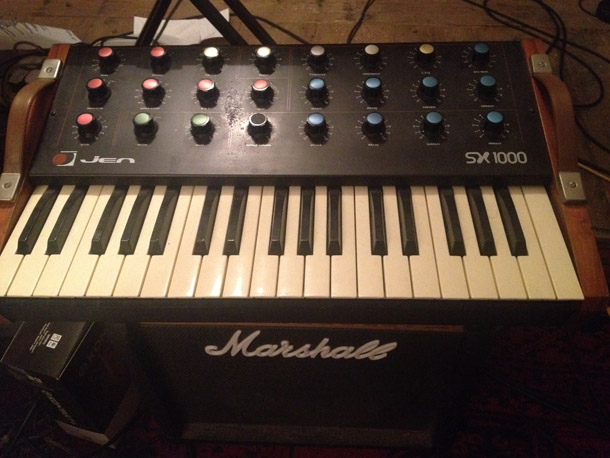
You’ve done film and TV, but you’ve also composed for video games. Is there a massive difference?
There kind of is and there kind of isn’t. Sometimes you’re dealing with large amounts of money, so you’ve got orchestras and things and sometimes it’s just you in your bedroom with a kazoo or something. But I think if you approach something and think, “What is going to work best for this project?” then they are all quite similar in a way.
It boils more down to the project and how you approach it rather than the medium. Like with LittleBigPlanet . The game is this beautiful mad, artistic mishmash of textures and colours and ideas and with the music on that we tried to do that as well. We stuck together old synth and orchestral bits and old strings, and made a weird sort of sound landscape. Whereas if you do something like Upstairs Downstairs , somebody whistling over some drumbeats is not really going to work on that. You’re dealing with something that is much more of a period piece so you’re gonna go a bit more traditional because the show is traditional. I’m always trying to push things forward in terms of what music is doing on a show, but sometimes there’s no point doing that for the sake of it if the show doesn’t want it.
You also worked on the supernatural horror movie The Awakening last year. Presumably no marxophones for that at one?
The director of that is a guy call Nick Murphy who is a fantastic, fantastic director and I’ve worked with him on a number of things. We’ve got a very good relationship. That is kind of how you write the best music, when someone really trusts you. We went through all kind of ideas for that. We did a lot of stuff with high pitched recorders. We got a big choir in – The Crouch End Festival Chrous. They do the, “Aaaahhh,” bits.
That was a big number. I went to Abbey Road to record it with a huge orchestra because the film needed that kind of weight. I really liked working on that film. I thought Nick did a great job and I’m just about to do his new film called Blood which has got Paul Bettany and Mark Strong in it.
What’s that about?
Sort of about these two brother who are policemen, and they’re up North and there is a murder. I don’t want to say too much. I make a cameo as a drunken guitarist. I don’t know if that’s going to end up on the cutting room floor or not.
What about that old theory that if you notice the music, it’s not doing its job properly?
I don’t buy into that, “You don’t notice a good score” stuff. Like with actors, where with some films you want somebody who is in your face. To me a really good score is: if you hear it away from the show, does it make you think of the show? And if it does, that’s a good score.
Never thought of it like that.
Even if it’s just a weird atonal score – not necessarily something you can hum – if it makes you think of what it’s from, it’s good.
I’ve got to ask, have you heard about whether there’ll be another series of Dirk Gently ?
No. I hope so. Everyone on this show… it’s a team like I have had no experienced of on TV for so long. Everybody loves working on it. Everybody pulls together. Everyone is working with no money – tiny budgets – but pushing it as far as they can. Calling in every favour. Everyone from the actors – Stephen Mangan is a massive, massive Douglas Adams nut and he cares about Adams’s legacy – down to the producers and the directors and the writers and me. We all really, really care about Dirk and we all 100% want there to be more Dirk .
That, unfortunately, is in the hands now of nonsense BBC politics because thanks to Rupert Murdoch leaning on Cameron and resulting in the BBC licence being heavily cut, that meant BBC Four lost its drama budget.
And you know, I work on a lot of the shows that come back and I’m not that fussed. This show I really, really want it to come back.
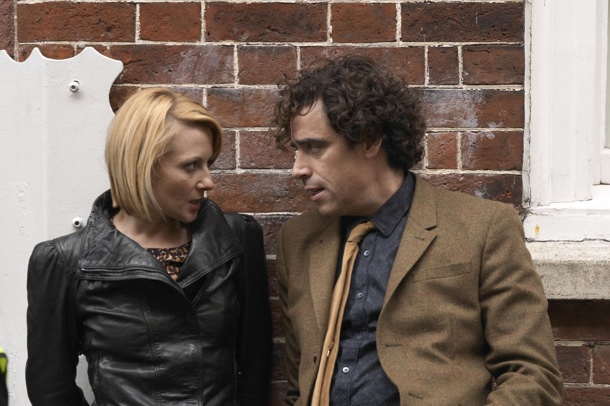
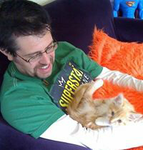
Dave is a TV and film journalist who specializes in the science fiction and fantasy genres. He's written books about film posters and post-apocalypses, alongside writing for SFX Magazine for many years.


